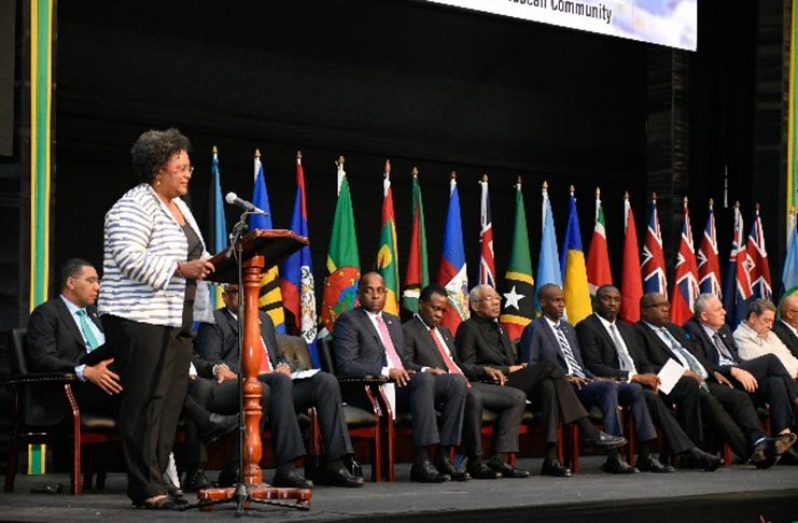– transportation of people, goods to come under scrutiny
– proposals pending for joint procurement, digital commerce
THE Caribbean Community (CARICOM) is considering a proposal for a protocol on re-opening international borders among Member States, as a means to lend support during the coronavirus pandemic.
This was discussed at the Ninth Special Emergency Meeting of the Conference of Heads of Government of CARICOM via video conference, on Wednesday, where all 15 Member States and the five Associate Members were represented.
In a subsequent release, CARICOM stated that when such a decision is taken, all Member States would simultaneously adhere to the protocols established.
Leading up to the key meeting, CARICOM Chair, Prime Minister of Barbados, Mia Mottley, had stated that there would be discussions on the possibility of common border policies as a means for CARICOM Member States to sustain themselves during the crisis.
In recent times, international experts have surmised that it is likely that, as the threat of COVID-19 minimises in some Regions, there may be agreements for specific regions to open up travel to member countries.
Mottley has envisioned that “regional blocks” will become more important as countries worldwide may remain fearful of full globalization, regarding travel, even after the pandemic begins to subside.
She said that countries will have to rely on their neighbours and there is no better time for CARICOM to band together than now.
In the interim of these protocols being decided upon, it was agreed that the transportation of people and goods, by air and sea inter-regionally, will come under scrutiny. Primary reference will be given to the operations of regional air carriers which have been adversely affected by the measures adopted to contain the virus.
At the emergency meeting, the Heads of Government also agreed on a general way forward in the battle against the COVID-19 pandemic.
They agreed on a collective approach to the International Financial Institutions in accessing assistance to meet the financial fiscal challenges arising from the crisis.
Several institutions such as the World Bank, International Monetary Fund (IMF) and the European Union (EU), have made known their intent to financially assist countries most in need.
To ensure that CARICOM countries receive attention, it was urged at the meeting that the criterion of Gross Domestic Product (GDP) per capita not be the sole consideration in assessing the needs of CARICOM. It was explained that an understanding of each country’s vulnerability is a far better measurement to determine need, given that the Region faces multiple challenges.
Heads of Government called for the lifting of sanctions on Cuba and Venezuela on humanitarian grounds, as all countries must be part of the global effort to combat the COVID-19 pandemic.
“Heads of Government were of the view that it was regrettable that resources for the World Health Organisation were being threatened, at a time when all must join in leading the fight against the pandemic,” the release stated.
Regarding a Common Public Health Policy for CARICOM, it was agreed that proposals for same would first be presented to the Ministers of Health. This would include proposals for joint procurement with the inclusion of pharmaceuticals, personal protective equipment (PPE) and sourcing of additional medical personnel. The joint procurement would assist in addressing supply constraints being experienced.
As it relates to food security, any arising issues would be considered in the context of the CARICOM COVID-19 Agri-Food Risk Management Framework which was circulated to Member States, following a meeting of Ministers of Agriculture last month. It serves to address, in particular, the production and supply of food products.
Proposals will also be formulated for the building of a “robust digital architecture”, including governance, to facilitate digital commerce and to assist in the fight against the virus.
On the topic of security, The Council for National Security and Law Enforcement (CONSLE), which met last Wednesday, April 8, has been considering the threats to security, during the course of the pandemic.
CONSLE is an organ of CARICOM incorporated into the Revised Treaty of Chaguaramas in 2009 for the organization of common regional security strategies. Their recommendations will also come before the Heads of Government.
During the video conference, the leaders received presentations from the Caribbean Public Health Agency (CARPHA), the University of the West Indies (UWI), the Caribbean Development Bank (CDB) and Archbishop Jason Gordon.
Executive Director of CARPHA, Dr. Joy St John indicated that the Region had done fairly well in its response to the pandemic which was a direct result of the early implementation of measures which helped to contain the virus. She recommended a coordinated approach as the Region prepares for the next phase of the virus.
Meanwhile, the CDB presented the economic implications of the pandemic for the Community and ideas for stimulating economic activity moving forward.
The UWI researchers included projections for the future of the virus in the Region in their presentation, while Archbishop Gordon spoke to the social impact of the COVID-19, as well as ideas to alleviate those challenges.
The Heads of Government also agreed that additional technical work would be undertaken, in specific areas, to be presented for their consideration at another meeting, within two weeks, and after the relevant ministerial councils would have reviewed the proposals.




.png)









